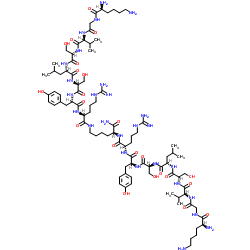| Description |
CTCE-9908 is a potent and selective CXCR4 antagonist. CTCE-9908 induces mitotic catastrophe, inhibits migration and induces cytotoxicity in CXCR4-expressing ovarian cancer cells[1][2].
|
| Related Catalog |
|
| Target |
CXCR4
|
| In Vitro |
CTCE-9908 (0-300 μg/mL; for 10 d) inhibits migration and growth in CXCR4-expressing in ovarian cancer cell lines (IGROV, TOV21G and SKOV3). CTCE-9908 inhibits ovarian cancer cell migration to CXCL12. CTCE-9908 does not cause apoptosis or cellular senescence, but induces multinucleation, G2-M arrest, and abnormal mitosis in ovarian cancer cells. CTCE-9908 deregulates DNA damage checkpoint proteins and spindle assembly checkpoint proteins at G2-M phases of the cell cycle[1].
|
| In Vivo |
CTCE-9908 (25, 50 and 100 mg/kg; s.c.; 5 days per week for 4.5 weeks) alone slows the rate of primary breast tumor growth, with a 45% inhibition of primary tumor growth at 3.5 weeks of treatment with 50 mg/kg of CTCE-9908 in FVB/N TgN (MMTV-PyMT)634 male mice[2].
|
| References |
[1]. Joseph Kwong, et al. An antagonist of the chemokine receptor CXCR4 induces mitotic catastrophe in ovarian cancer cells. Mol Cancer Ther. 2009 Jul;8(7):1893-905. [2]. Saima Hassan, et al. CXCR4 peptide antagonist inhibits primary breast tumor growth, metastasis and enhances the efficacy of anti-VEGF treatment or docetaxel in a transgenic mouse model. Int J Cancer. 2011 Jul 1;129(1):225-32.
|


